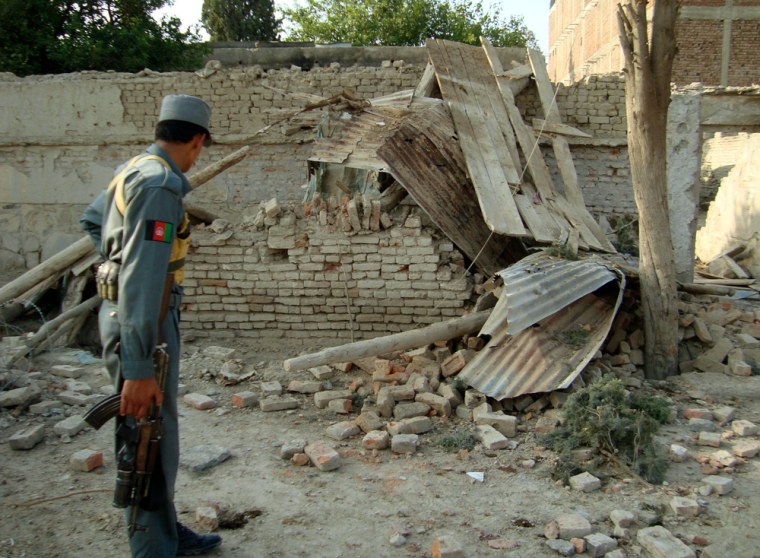For the second time in a week, Taliban fighters armed with suicide vests and automatic weapons attacked a provincial capital in eastern Afghanistan on Saturday, triggering hours-long gunbattles that left seven militants dead, officials said.
The latest militant attack came less than a month before Afghanistan's Aug. 20 presidential election. U.S. and NATO forces have stepped up operations in hopes of ensuring enough security for a strong voter turnout.
The assault in Khost began when at least six Taliban fighters carrying AK-47s and rocket-propelled grenades stormed the area around the main police station and a nearby government-run bank. All were shot and killed before they could detonate their suicide vests, the Interior Ministry said in a statement.
A seventh attacker detonated a car rigged with explosives near a police rapid reaction force, wounding two policemen, the ministry said.
Interior Ministry spokesman Zemeri Bashary said all the attackers were killed, but the Defense Ministry later said an eighth attacker may have escaped. The ministry said no government forces were killed but 14 people were wounded — 11 civilians and three police.
The attack came five days after Taliban militants launched near-simultaneous assaults in Gardez, about 50 miles northwest of Khost, and in the eastern city of Jalalabad. Six Afghan police and intelligence officers and eight militants died in the two attacks.
Though the three attacks did not kill large numbers of Afghan or U.S. security forces, they showed the tenuous security situation in Afghanistan's countryside. Such attacks grab headlines in Afghanistan and raise the question of whether voters can safely go to polls.
The U.S. envoy to Afghanistan and Pakistan, Richard Holbrooke, alluded to those concerns, saying Saturday it was "extraordinary" to hold an election in the middle of war. He said the vote faces "many complex challenges," including security issues and access to polls for women. Authorities need a respectable turnout for the results to appear credible both here and in countries supporting the government.
Holbrooke met separately with President Hamid Karzai and his top two challengers — former Foreign Minister Abdullah Abdullah and former Finance Minister Ashraf Ghani.
Abdullah told Holbrooke that he is struggling to fight Karzai's built-in advantage as president with government assets at his disposal.
The former foreign minister noted a recent election commission report that said 70 percent of election coverage on the country's state TV channel goes to Karzai. "That's a very worrying sign," Abdullah said. "All the ministers, the main ones, are out doing campaign work."
Holbrooke said he was "concerned" over reports of state media bias. Karzai's campaign has denied the president is using government tools to campaign.
Favored candidate
Karzai is believed to be the favorite to win the presidency, but he must win more than 50 percent on Aug. 20 to avoid a run-off. Analysts say it is likely Karzai will win unless the almost 40 challengers rally behind a single opposition candidate.
Holbrooke and U.S. Ambassador Karl Eikenberry toured the election commission and watched dozens of Afghans enter voter registrations into banks of computers. He said the "whole world" will be watching the election.
Responding to a question at a news conference about whether there was enough security in the countryside to hold a vote, Holbrooke said: "Do you want the Afghanistan people to abandon the election in the face of a small band of Taliban?"
U.S. troops helped provide security during the Khost attack but were not involved in the battle.
Khost is about 15 miles from the Pakistani border and has long been a flash point because of smuggling across the frontier. Last May, 11 Taliban suicide bombers struck government buildings in Khost, killing 20 people and wounding three Americans.
Also Saturday, a British soldier was killed by a roadside bomb in Helmand province, the focus of major offensives by U.S. and British forces. The soldier was the 20th British service member killed in Afghanistan this month and the 189th since the war began in 2001.
Fighting has increased sharply in Afghanistan this month after President Barack Obama ordered thousands more U.S. troops to the country, shifting the focus of the war against Muslim extremism from Iraq.
At least 66 international troops have died in July, the bloodiest month of the nearly eight-year war.
More on Afghanistan |
